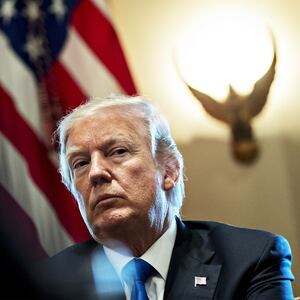It’s not the crime—it’s the cover-up.
That’s the takeaway from the Supreme Court’s compromise decision Monday night to allow the questioning of two Justice Department officials regarding a controversial proposed change to the U.S. Census—but not the man ultimately responsible for it, Commerce Secretary Wilbur Ross.
The action is part of one of six lawsuits brewing about the change, which would ask census respondents if they are U.S. citizens or not. The lawsuits aren’t really about the census question anymore (liberals say it will discourage Latinos from participating; conservatives say it’s harmless), and are instead focused on Secretary Ross’s contradictory statements about it. It’s become Censusgate.
ADVERTISEMENT
In March, Ross said (under oath) that the Department of Justice requested the change, saying it was necessary for enforcement of the Voting Rights Act, and that he hadn’t talked with the White House. Both statements appear to have been untrue. Actually, Ross initiated the change at the behest of White House aides Steve Bannon and Kris Kobach, and then had the Justice Department make their request as cover.
District Court Judge Jesse Furman had ordered Ross, as well as DOJ official, John Gore, to answer questions about their role in the affair. The federal government went to the Supreme Court to put that order on hold.
The court split the difference. The questioning of Gore may proceed, it held in an unsigned opinion, but not Ross. The compromise is only temporary: it’s expected that Judge Furman’s order will be appealed, and the court will soon consider it in full. That’s when we’ll have a proper ruling on who can be questioned and whether the lawsuit itself may continue.
Because the order was brief and unsigned, its reasoning is unknown. Presumably, the rationale is that if Ross were questioned under oath, he might be forced to contradict his previous sworn testimony, thus exposing himself to criminal liability. Most importantly, he wouldn’t be able to take those words back, even if the court later held that he didn’t have to testify. The damage would be done.
With Gore, however, there’s no previous testimony, and thus no liability for a perjury or lying to Congress. So there’s no downside to his testifying right away, even if the court ultimately rules he doesn’t have to do so.
It’s not known who wrote the opinion for the court, although the fact that it’s a compromise, and that only two justices—Gorsuch, joined by Thomas—dissented from the decision makes it look like Chief Justice Roberts’ handiwork.
Justice Gorsuch’s dissent is bizarre. It totally misstates the nature of the lawsuit, ignores the evidence of perjury, and essentially decides the entire case before it’s even been heard. Even for an interim order, it’s a very peculiar bit of reasoning.
Court-watchers will note that Justice Kavanaugh did not join Justice Gorsuch’s dissent.
So what does all this mean?
First, it’s clear that this issue isn’t going away. The citizenship question may seem like a small matter, but not when you consider the consequences. Several studies conclude that it will lead to under-participation by communities of color, especially Latinos. And that means that Latino-rich states like California and New York (and possibly Texas) will get less representation in the House of Representatives than they otherwise should, and will get less money from the federal government.
Second, it looks like the lawsuit itself isn’t going away either, with further Supreme Court action likely before the end of the year. Right now, more eyes are focused on the midterm elections, voter suppression, the Trump administration’s anti-transgender campaign, and the Mueller investigation. But the Supreme Court, which had set a relatively bland and un-controversial docket for the 2018-19 term, is going to be returning to the census issue very soon.
Third, Censusgate may, surprisingly, become the template for how the Supreme Court treats the bevy of lawsuits alleging various forms of corruption on the part of the Trump administration, from Emoluments Clause violations to Stormy Daniels. To be sure, Censusgate is less grave than, say, the Russia imbroglio, but some of the issues are the same—especially about whether executive branch officials can be compelled to testify.
Finally, as black voters in Georgia are literally turned away from the polls, and Native Americans in North Dakota are barred from voting because of Republican tricks, Censusgate has the potential to wake more people up to the GOP’s desperate efforts to maintain the power in the face of demographic change. Ultimately, if you can count fewer Latinos in the census, you can reapportion Congress to dilute their power.
That’s why the likes of Bannon and Kobach proposed this change to Ross, and that’s why Ross appears to have lied about it to Congress. The census is supposed to be above politics, but the citizenship question is the lowest of political tricks.






